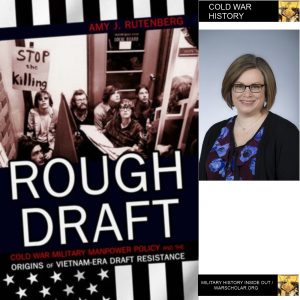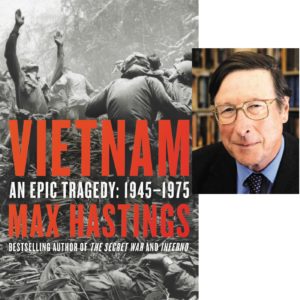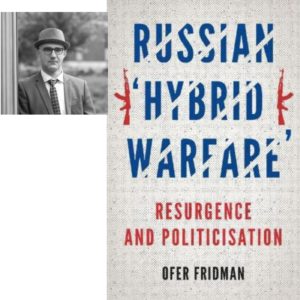Podcast: Play in new window | Download
Subscribe: RSS
 Check out this book here https://amzn.to/3dHHiZ6
Check out this book here https://amzn.to/3dHHiZ6
Dr. Amy Rutenberg studies gender history. Her first book is about the US draft during the Cold War, especially during the Vietnam War. We discussed the book.
0:56 – Amy talks about how she got into writing on the US draft of the early 20th century.
2:08 – Amy talks about the focus of the book on why it became socially acceptable for men to avoid the Vietnam War.
4:01 – Amy talks about how the draft was applied to various social classes in the US.
10:26 – Amy talks about what the active duty thought about DoD draft policies.
13:42 – Amy talks about when the draft was in place and when it was used.
14:30 – Amy talks about how the book is broken down. It goes chronologically starting with WWII.
15:32 – Amy talks about the idea of masculinity and the draft and enlistment.
18:35 – Amy talks about protests against the Vietnam War and draft changes.
19:51 – Amy talks about the ideas of nuclear war and the strategic goals of the draft.
22:27 – Amy goes into detail about the Selective Service Boards.
23:40 – Amy explains the interaction between the Selective Service and the draft.
26:20 – Amy talks the use of soldiers in testing nuclear weapons.
27:31 – Amy describes how the services requested draftees.
29:06 – Amy talks about the pros and cons versus being drafted versus enlisting.
31:49 – Amy talks about how she researched the book. She also goes into detail about
draft counseling and conscientious objection.
37:03 – Amy talks about the tension between supporting wars but not volunteering to go.
38:10 – Amy talks about new things she discovered about the draft during WWII and how people approached it.
40:22 – Amy talks about deferments.
43:02 – Amy discusses some of the issues women faced with the draft.
45:00 – Amy goes into details about conscientious objector deferments.
47:20 – Amy discusses who were getting these deferments created and changed.
55:57 – Amy can be found on twitter @amyjay401.
Links of interest
https://www.cornellpress.cornell.edu/book/9781501739583/rough-draft/#bookTabs=1
For more “Military History Inside Out” please follow me at www.warscholar.org, on Facebook at warscholar, on twitter at Warscholar, on youtube at warscholar1945 and on Instagram @crisalvarezswarscholar. Or subscribe to the podcast on Apple Podcasts | Stitcher | Spotify
Guests: Amy Rutenberg
Host: Cris Alvarez
Tags: military, history, military history, conflict, war, interview, non-fiction book, gender, world war two, WWII, draft, deferment, STEM, McNamara, cold war, vietnam war, project one hundred thousand, infantry, selective service, US Congress, conscription, Carter, Afghanistan, National Archives, draft counseling, Lewis Hershey
Check out this book here https://amzn.to/3dHHiZ6
As an Amazon Associate I earn from qualifying purchases.


 Ofer Fridman is an academic who has studied Russian military thinking for many years. We discussed his latest book on the concept of Russian Hybrid Warfare.
Ofer Fridman is an academic who has studied Russian military thinking for many years. We discussed his latest book on the concept of Russian Hybrid Warfare.